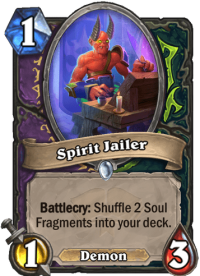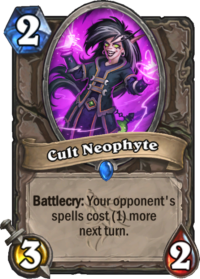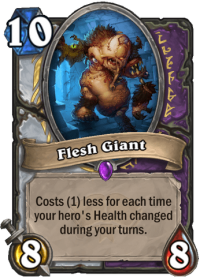Our budget Zoo Warlock deck list & guide for the Scholomance Academy expansion will teach you how to play this budget list. This guide includes Mulligans, Gameplay Strategy, Card Substitutions, and Combos/Synergies!
Introduction to Budget Zoo Warlock

Zoo Warlock is one of the oldest archetypes in Hearthstone, dating back to the early 2014, shortly after the game’s official release. Of course, it looked quite different back then, but the basic idea behind it remained similar throughout the years. Your goal is to play efficient, low cost minions that can trade well to gain tempo, and then refill your hand with Hero Power. The latest version of Zoo was created in Scholomance Academy, and it relies on self-damage cards, but runs some “change health” synergies in general, including a small Soul Fragment package.
Sadly, since we’re on the budget that limits us to only one Epic card (or rather two copies of it), I had to make a difficult choice between Darkglare, Diseased Vulture and Flesh Giant. All three are great, all three make the full deck competitive, but I think that Darkglare is the most important one – it lets you cheat a ton of mana and it works very well with all your self-damage cards. Luckily, the deck is actually quite close to the full build – once you throw those Epics in, you’re basically good to go.
Check out Hearthstone Budget Decks & Guides for All 10 Classes!
Budget Zoo Warlock Deck List
Budget Zoo Warlock Mulligan Guide
Higher Priority (Keep every time)
- 1-drops – Since you’re playing a fast deck that wants to get on the board, 1-drops are important. Spirit Jailer, Flame Imp and Tour Guide are all great keeps – one is a 1 mana 1/3 with an upside, you really love it, the second one is a 3/2 for 1 (while you damage yourself, you don’t mind it that much in most of the matchups), while the third one is a 1/1 version of one of the strongest Warlocks cards in the history – Kobold Librarian. We’ve also got Voidwalker, which is okay, but only if you’re missing the cards above, and Guardian Augmerchant, which is a good card, but not really a 1-drop, so you don’t want to keep it.
- Darkglare – It’s the bread and butter of this build – you want to keep it, since it will let you do some crazy mid game plays. If it sticks you can often play 4-6 extra mana worth of stuff next turn. And in the worst case scenario, it’s a 3 mana 3/4.
Lower Priority (Keep only if certain conditions are met)
- Expired Merchant – Keep with Hand of Gul’dan. 2/1 for 2 that draws 3 cards and then puts more copies of that card draw into your hand is really amazing. With this play, you won’t likely run out of cards until the end of the game.
- Hand of Gul'dan – Keep in slower matchups. Against Aggro you need all the tempo you can get, but against slower decks you will be holding back anyway, and you simply need that refill to stay in the game. You will eventually find a way to trigger it – be it Expired Merchant, Nightshade Matron or a simple Soulfire.
Budget Zoo Warlock Play Strategy
The base idea behind this deck is simple, like I’ve said before the concept is years old now. You want to get on the board quickly, then keep refilling your hand, keeping the board clean, while smacking your opponent in the face at the same time.

Against Aggro, tempo is absolutely key – you have zero comeback mechanics against wide boards, so if you lose control, you will most likely just lose the game. That’s why you don’t want to focus on slow plays like drawing more cards – you want to play minions quickly so you have something to trade with at all times. A good example would be choosing the T1 play – Tour Guide is great, but it’s only a 1/1, making it a sort of not ideal choice against other aggressive decks. You’d much rather drop a Spirit Jailer, which doesn’t draw you a card, but is 1/3, which means that it won’t get killed so easily and you might be able to trade it into something. Another thing is conserving your health – that’s not a thing in this deck. Sadly, unless you get really ahead, you can’t think about it. It makes the deck pretty weak against burn-oriented or “face” decks, but you can’t help that – if you start avoiding to take any self-damage, you will just lose. You have to ignore it and hope that the extra tempo that comes with that will get you back (especially your Darkglare combos, which let you do A LOT of things during a single turn). Unless you draw really badly, you shouldn’t run into card draw issues, so using Soulfire just to deal with a minion, even if it means discarding something you wouldn’t want, is something that you will simply have to do from time to time.

Against Control, your play style is quite different. You’re in the lead from the get-go – they don’t really play that many early game minions and even if they do, they’re not too threatening. You play proactively, they play reactively. This time, while you still want to stay on the board all the time, you don’t need to go all-in. You have to balance between tempo and value – if you go all in and run out of cards, your turns will be quite weak. Your main enemy are AoE board clears – it’s important to know the matchups and learn to avoid them. Of course, you can’t stop your opponent from playing them, but you can go into your opponent’s key turns knowing how much AoE damage they can deal. For example, if you’re going into Priest’s Turn 3 you know that they can drop Breath of the Infinite – so it’s a good idea to play some 3/4 health minions instead of 1-2 health minions, so they won’t die to AoE. Another way to stop them is playing Cult Neophyte just before their AoE turn. For example, if you play against Warrior and their next turn is Turn 5, then you drop it and prevent them from playing Brawl. Yes, it’s for one turn only, but that one turn can win you the game if they haven’t expected it. You can also stop other key turns like Paladin’s Libram of Hope or Druid’s Guardian Animals, making the card really solid, but you need to time it correctly. Another good way to use it is to play it on your Darkglare turn – e.g. Darkglare + Raise Dead + a bunch of other stuff + Neophyte or even two. This way your board has a much higher chance to survive, and that’s often a game over for your opponent.
The deck also runs some Soul Fragment synergies. You can shuffle them with 2 cards (Spirit Jailer + Soul Shear), which doesn’t seem like much, but with how much you cycle it should not be a problem to find them. Then, you can use them to trigger Shadowlight Scholar‘s Battlecry (which is great – 3 mana 3/4 that deals 3 damage is simply amazing), activate Brittlebone Destroyer (it’s RNG, but trust me, it will come handy at times) or just heal up a bit. In the full build they’re also used to discount Flesh Giant, but we sadly don’t have it here.
Future Card Replacements for Zoo Warlock
Here’s an example full Zoo Warlock build you can work towards:
- 0Budget Zoo Warlock Deck List & Guide (Scholomance Academy)2
- 0Budget Zoo Warlock Deck List & Guide (Scholomance Academy)2
- 0Budget Zoo Warlock Deck List & Guide (Scholomance Academy)2
- 1Soulfire2

- 2Expired Merchant2

- 2Kanrethad Ebonlocke1

- 3Darkglare2

- 3Shadowlight Scholar2

- 4Diseased Vulture2

- 4Nightshade Matron2

- 6Hand of Gul’dan2


As you can see, the main differences between the builds are the ones I’ve already covered previously – full version runs 2x Diseased Vulture and 2x Flesh Giant, which are another self-damage (and healing in case of Giant) pay-offs. With those, the deck is more consistent and has even more powerful turns. Other than that, it runs Kanrethad Ebonlocke, which is honestly not very important in this build in case of synergies. As in, you can easily play without it. It’s just a generic solid minion – the first 3/2 body makes your Demons (which you run quite a lot of) cheaper, so e.g. you can drop it and play a 1-drop Demon on the same turn, or play it and if it survives curve into Matron on T3. And after it dies, you get another power spike turn at some point in the game if it goes that long.
Overall, the Epics are enough to turn it into a competitive meta build, which means that even the full build is quite cheap to play. And that’s great news for all the budget players!










